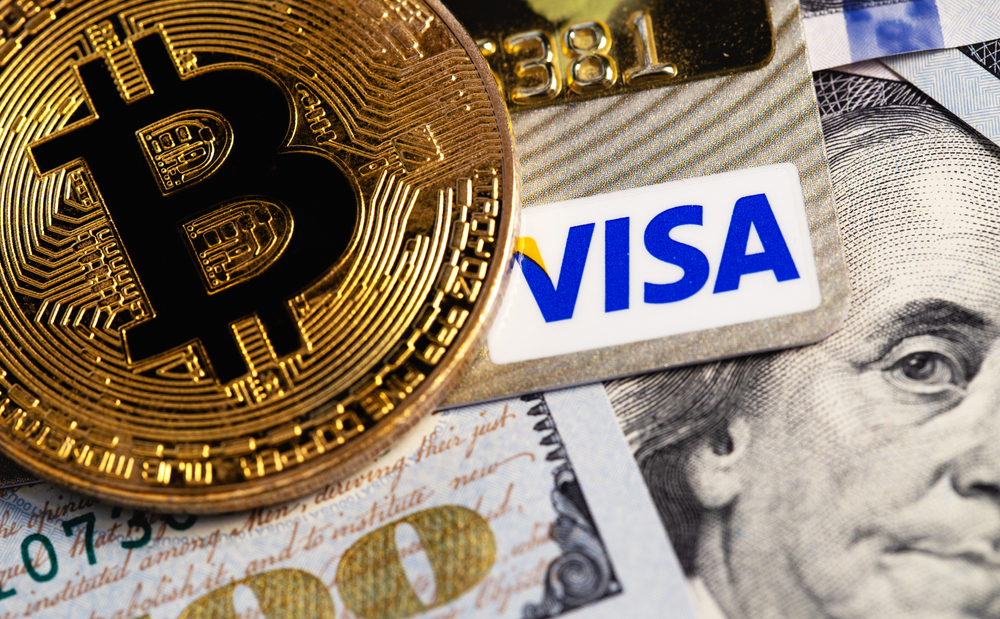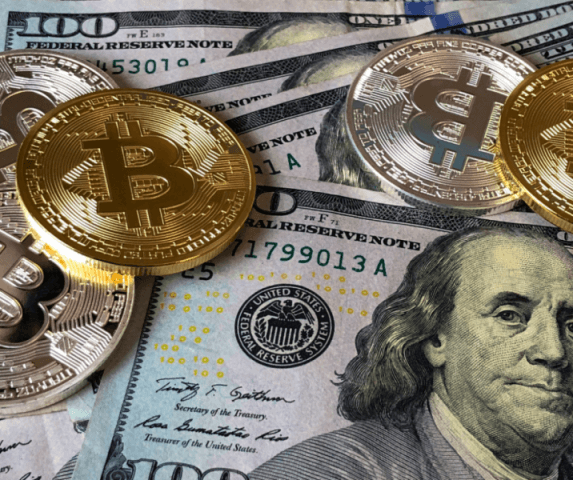The Long Road to De-dollarization: Crypto’s Role in a Shifting Monetary Regime

Imagine a world where the U.S. dollar doesn’t reign supreme in our global economy – it might seem like a scene from a sci-fi story, but this scenario is becoming more of a reality each day. Nations across the globe are gradually reducing their reliance on the dollar, exploring and embracing alternative monetary systems. And leading this revolutionary charge? Cryptocurrencies. This shift raises many questions: Why is this happening now? What implications will it have for our financial future? In an era marked by geopolitical tensions, economic challenges, and the quest for greater autonomy, cryptocurrencies are emerging as a beacon of hope and innovation. They promise a future where financial transactions are decentralized, secure, and, most importantly, not tied to any single currency’s fate. As we explore this fascinating journey towards de-dollarization, let’s uncover how cryptocurrencies are setting the stage for a new monetary regime, potentially reshaping our global economy in ways we’ve yet to fully understand.
Unraveling De-dollarization

The term ‘de-dollarization’ might sound complex, but the idea behind it is quite simple. It refers to the global trend of moving away from the U.S. dollar in international trade and reserves. Several forces are driving this shift, including geopolitics, trade wars, and the very condition of the U.S. economy itself. Let’s take a closer look at these factors:
- Geopolitical Tensions: In recent years, geopolitical issues have prompted some countries to seek alternatives to the dollar, aiming for greater economic independence.
- Challenging US Economic Conditions: The U.S. has been facing its own set of economic challenges, from increasing national debt to the Federal Reserve’s monetary policies, prompting concerns over the dollar’s stability.
- Trade Wars: The ripple effects of various trade wars have led countries to reconsider their dependency on the dollar, seeking to avoid being caught in the crossfire of economic disputes.
The Changing Monetary Landscape
As nations begin to shift away from the dollar, it’s leading to a significant reshaping of the global monetary landscape. This movement isn’t just about choosing different currencies for trade; it’s about rethinking the very foundations of our global trading system. The implications of this shift are profound, touching everything from international economic relations to how countries manage their resources and conduct trade.
The Potential Gain
But it’s not all doom and gloom. Moving away from dollar dependency offers several benefits. Countries gain increased monetary policy autonomy, allowing them to manage their economies more effectively without being overly influenced by U.S. policies. Additionally, this flexibility can help buffer economies against global financial shocks, making them more resilient in the face of adversity. Here are a few potential advantages:
- Enhanced Economic Stability: Reduced reliance on the dollar can help countries protect themselves from volatility in the U.S. economy.
- Greater Monetary Policy Autonomy: Countries can pursue monetary policies that are more closely aligned with their economic conditions and objectives.
- Increased Flexibility: With a multi-currency system, nations can diversify their reserves and trade in currencies that offer favorable terms, enhancing their bargaining power on the global stage.
As we stand on the brink of what could be a monumental shift in the global monetary regime, it’s worth asking: how will cryptocurrencies facilitate this transition, and what role will they play in the future economy? Stay tuned for the next part, where we’ll delve into how the crypto transformation is disrupting the traditional financial ecosystem.
The Crypto Transformation

In the ever-evolving financial landscape, where traditional norms are continually being questioned, cryptocurrencies have emerged as a beacon of innovation. By challenging the status quo, they’ve introduced a new paradigm in how we perceive and engage with the global economy.
Faster, Cheaper, More Secure Transactions
One of the most appealing aspects of cryptocurrencies is their ability to facilitate transactions that are not only faster but also cheaper and more secure than traditional methods. This efficiency is largely due to the decentralized nature of cryptocurrencies, which allows them to bypass traditional banking intermediaries. Consider the story of a small business owner in Kenya who turned to Bitcoin to avoid steep bank fees and slow processing times. By doing so, he was able to increase his profit margins and grow his business at an unprecedented rate. This is not an isolated case; stories like these are emerging from all corners of the globe, showcasing the revolutionary impact of cryptocurrencies.
The Blockchain Revolution
At the heart of the crypto transformation is blockchain technology. This innovative technology provides a transparent, immutable ledger for transactions. Its significance cannot be overstated; it’s not just a foundation for cryptocurrencies but a revolutionary way of recording and securing data across various industries. From enhancing supply chain management to transforming electoral systems, blockchain’s potential is vast and largely untapped. “Blockchain is to money what the internet was to information,” says an industry insider, encapsulating its transformative power.
The innovations brought about by cryptocurrencies and blockchain technology are not just theoretical. Studies show that blockchain could reduce business costs by up to $20 billion annually by 2022. This isn’t just disruption; it’s a complete overhaul of the financial ecosystem as we know it.
But what does this mean for the future? How will this technological revolution shape the economic landscape? Could cryptocurrencies be the key to not just transforming individual transactions but reshaping global economies?
If you’re intrigued by the possibilities of a world where financial transactions are faster, cheaper, and more secure, you’ll want to stay tuned. The impact of cryptocurrencies and blockchain technology is just beginning to be felt. As we explore the future possibilities, one can’t help but wonder: What new horizons will this crypto transformation unlock? Join me in the next segment as we delve into the future of economies with crypto.
The Future of Economies with Crypto

Picture a world where financial transactions glide across borders like birds in flight, unencumbered by traditional banking barriers. This is not a mere fantasy; it’s a reality that cryptocurrencies are sculpting as we speak. The impact of these digital assets on future economic landscapes is profound, offering a vision of efficiency and growth previously unimagined.
Efficiency and Economic Growth
“The real voyage of discovery consists not in seeking new landscapes, but in having new eyes.” – Marcel Proust. This quote resonates deeply when we explore how cryptocurrencies can redefine our perception of economic efficiency. By removing the need for intermediaries, cryptos offer a streamlined approach to financial transactions, promoting speed and reducing costs. Studies have shown that blockchain technology, which underpins cryptocurrencies, can significantly decrease transaction times and fees, fostering an environment ripe for economic growth.
- Direct cross-border payments that dodge banking systems can save billions in transaction fees annually.
- Smart contracts automate and secure deals without human intervention, slashing costs and time.
- The inherent transparency of cryptocurrencies could reduce fraud and corruption, enhancing economic health.
Given these factors, it’s clear that cryptocurrencies have the potential to turbocharge economies, particularly in developing regions where traditional banking infrastructure is lacking or corrupt.
New Investment Horizons
The advent of cryptocurrencies is akin to the discovery of new lands for investors. These digital assets have opened up a treasure trove of opportunities that were unthinkable before. From Bitcoin to burgeoning altcoins and tokens representing real-world assets, the diversity of investment options is staggering. Moreover, the rise of decentralized finance (DeFi) platforms allows investors to engage in lending, borrowing, and earning interest on their crypto assets, often at rates far exceeding those of traditional banks.
- Investment in digital currencies is not only about potential price appreciation but also gaining access to a new ecosystem of financial services.
- Staking cryptocurrencies can earn investors passive income, a compelling proposition for those seeking to diversify their income streams.
- Tokenization of real-world assets on blockchain platforms is democratizing investment in commodities, real estate, and even art, previously domains of the wealthy.
The cryptographic world is indeed burgeoning with opportunities, offering novel ways for individuals and businesses to grow their wealth.
But, is the world ready to fully embrace these changes? How will traditional financial institutions respond to these evolving landscapes? As we shred the old, cumbersome financial cloaks and step into sleek, digital suits of blockchain and crypto, the promise of a revitalized economy is exciting but also laden with questions. What’s next in this evolution, and how can we prepare for the unavoidable shift? Stay tuned, as we ponder these questions in our forthcoming discussion.
Our journey through the realms of cryptocurrency and its impact on the global economy is far from over. In the realm of de-dollarization and the role of crypto, the path forward promises even broader horizons. Are you ready to explore how cryptocurrencies could be the linchpin in the global shift away from the U.S. dollar? The answers might surprise and enlighten you.
The De-dollarization and Crypto Connection

The buzz around cryptocurrencies has been impossible to ignore. But what’s even more fascinating is the potential role these digital assets could play in shifting the global financial paradigm away from the U.S. dollar. Let’s explore the intertwining paths of de-dollarization and cryptocurrency, and how this duo could redefine our monetary system.
Autonomy and Flexibility with Crypto
Imagine a world where countries wield greater control over their economic fate, free from the constraints of a dominant global currency. This isn’t a mere fantasy—cryptocurrencies are paving the way. Here’s how:
- Decentralization: Crypto operates on a decentralized network, offering countries a chance to develop a more autonomous financial system.
- Reduced Reliance on USD: By adopting cryptocurrencies, nations can diversify their reserves and reduce their dependency on the dollar.
- Adaptability: The agile nature of cryptocurrencies allows for quicker adaptation to economic changes and shocks.
An apt quote by Satoshi Nakamoto, the elusive creator of Bitcoin, captures this sentiment perfectly: “We have proposed a system for electronic transactions without relying on trust.” This idea of self-sovereignty is at the heart of cryptocurrencies, offering nations a unique opportunity to redefine their monetary policies.
Operating in a De-dollarized World
The prospect of a de-dollarized world conjures up many questions. How would global trade adjust? What would replace the dollar as the linchpin of international commerce? Here, cryptocurrencies could offer a clue:
- Global Trade on Blockchain: Blockchain technology could underpin a new international trade system, easing transaction processes and making them more transparent.
- New Trading Currencies: Cryptocurrencies could emerge as viable alternatives for settling international trade, bypassing the traditional banking system and its fees.
- Innovative Financial Instruments: The crypto ecosystem continually innovates, presenting new financial instruments that could be suited for global trade in a de-dollarized era.
This evolution would necessitate a recalibration of the world’s financial systems. By fostering a landscape where digital currencies thrive, we could see the emergence of a more equitable and flexible global economy. Yet, one must wonder, what challenges lie ahead in this transition? Are our current financial institutions ready for such a transformative shift?
The answers to these questions are complex and multifaceted. However, one thing is certain—the journey towards a de-dollarized world, with cryptocurrencies leading the charge, is as thrilling as it is uncertain. As we gaze into this future, we’re left pondering: What does this mean for average investors, governments, and global trade networks?
Stay tuned as we delve deeper into this narrative, exploring the resources and insights that shed light on a future shaped by cryptocurrency and de-dollarization. The next part of our journey promises to be even more revealing.
Relevant Resources

As we navigate through the complexities of the financial world’s transformation, it’s crucial to arm ourselves with knowledge. The road to understanding the impact of cryptocurrencies and their role in de-dollarization is rich with insights from leading platforms. Let’s explore some of these enlightening resources that shed light on the evolving landscape.
De-dollarization in the Age of Bitcoin
One cannot overlook the significance of Bitcoin in the narrative of de-dollarization. CoinDesk offers a compelling analysis that explores how Bitcoin is carving its path in this new era. Their report delves into the nuances of how Bitcoin stands as a beacon of financial autonomy, challenging the traditional hegemony of fiat currencies. It’s a fascinating read that underscores the cryptocurrency’s potential to remake global financial systems.
Looking Forward: Crypto Market Outlook
The future of cryptocurrencies remains a hot topic of debate and speculation. Coinbase provides a forward-looking perspective with its market outlook. They gather insights and data to forecast the trajectories of various cryptocurrencies, offering a glimpse into what the future holds. Their projections are not just numbers; they represent the evolving narrative of how crypto can reshape our financial identity.
It’s essential to recognize that the path to a de-dollarized world is not just about watching the numbers change on a screen. It’s about understanding the stories behind these numbers. “Currency is not just money, it’s a narrative,” as eloquently stated by an economist. By exploring these resources, we engage with the tales of struggle, resilience, and ambition that cryptocurrencies embody.
So, what’s next on our journey? How does the tapestry of regulation, market dynamics, and economic implications intertwine to shape the future of cryptocurrencies? Is the world ready for the shift that’s underway, or are we poised on the brink of challenges that could redefine our approach to global finance?
Stay tuned as we uncover the layers of remaining uncertainties and risks in the upcoming section. Together, we’ll peel back the curtain on the potential roadblocks and explore what lies beyond the horizon of the crypto revolution.
Remaining Uncertainties and Risks

The road to a world where cryptocurrencies lead the charge in de-dollarization is paved with myriad uncertainties and risks. As thrilling as this journey looks, it’s essential to acknowledge the challenges that could swerve the potential transformation off its path. Let’s take a closer look at the regulatory hurdles and economic implications that stand in the way.
Regulatory Hurdles
One of the most significant roadblocks to the widespread adoption of cryptocurrencies is the looming presence of regulatory hurdles. Governments and financial authorities worldwide are grappling with how to regulate digital currencies effectively without stifolding their growth. The delicate balance between innovation and consumer protection is hard to achieve, as evidenced by the varied regulatory responses across jurisdictions. These regulatory challenges are not merely theoretical but have practical implications for investors, companies, and everyday users navigating the crypto space.
Economic Implications
Beyond the regulatory landscape, the economic implications of a swift shift towards cryptocurrencies demand a thorough examination. Critics argue that transitioning too quickly could lead to market instability and heightened financial risk. The volatility often associated with cryptocurrencies poses a significant concern, potentially exacerbating economic disparities and undermining financial security for the unprepared. Nevertheless, this narrative is evolving, and ongoing research and real-world experiments continue to shed light on how these risks can be mitigated.
For a deeper understanding of these challenges, I recommend exploring a variety of resources. CoinDesk’s analysis delves into Bitcoin’s role in de-dollarization. Similarly, Coinbase offers a 2024 crypto market outlook that provides valuable insights into future trends. For a broader perspective, this Medium article examines de-dollarization and crypto’s role in de-globalization.
As we peer into the horizon, many questions remain. Will the regulatory and economic challenges prove too formidable, or can they be navigated with strategic foresight and innovation? The answers to these questions are critical to understanding the future dynamics of our global financial system. Stay tuned, as we will explore what lies beyond these uncertainties and how the brave new world of cryptocurrencies is shaping up in the concluding part of our series.
A wrap-up of the main points discussed about de-dollarization and the role of cryptocurrencies.

As we stand on the brink of a major shift in the global monetary regime, it’s clear that cryptocurrencies are playing a critical role in shaping a future less dependent on the U.S. dollar. Through the lens of de-dollarization, we’ve seen the potential of crypto to redefine financial autonomy and flexibility for countries worldwide.
Brave New World
The journey towards a world where the U.S. dollar doesn’t hold its age-old dominance is unfolding right in front of our eyes. Cryptocurrencies, poised at the helm of this revolution, are not just alternatives but viable options that provide a plethora of opportunities. From facilitating faster, more secure transactions to offering a hedge against economic uncertainties, crypto stands as a beacon for those nations seeking greater sovereignty over their financial destinies.
Journey Ahead
Yet, embracing this brave new world comes with its set of hurdles. Regulatory challenges and economic implications, such as the risk of market volatility and the need for a robust digital infrastructure, pose significant questions. Nonetheless, the potential benefits – including increased economic efficiency, new investment horizons, and a more equitable global monetary system – make this journey one that is undoubtedly worth embarking on.
Concluding Thoughts
In wrapping up, the path toward a de-dollarized world is intricate and laden with both opportunities and challenges. Cryptocurrencies, with their promise of decentralization and financial inclusivity, serve as a powerful catalyst in this transition. As we navigate this evolving landscape, it becomes clear that crypto doesn’t just offer an alternative to the traditional financial system; it’s rewriting the rules of the game. With careful regulation and global cooperation, we stand on the cusp of realizing a future where financial autonomy and global economic balance are not just ideals, but realities.
As we continue to witness the unfolding narrative of de-dollarization and the ascendancy of cryptocurrencies, let’s remain open to the vast possibilities that lie ahead. After all, we’re not just observers in this dynamic shift; we’re participants in the crafting of a new, more inclusive financial epoch.
